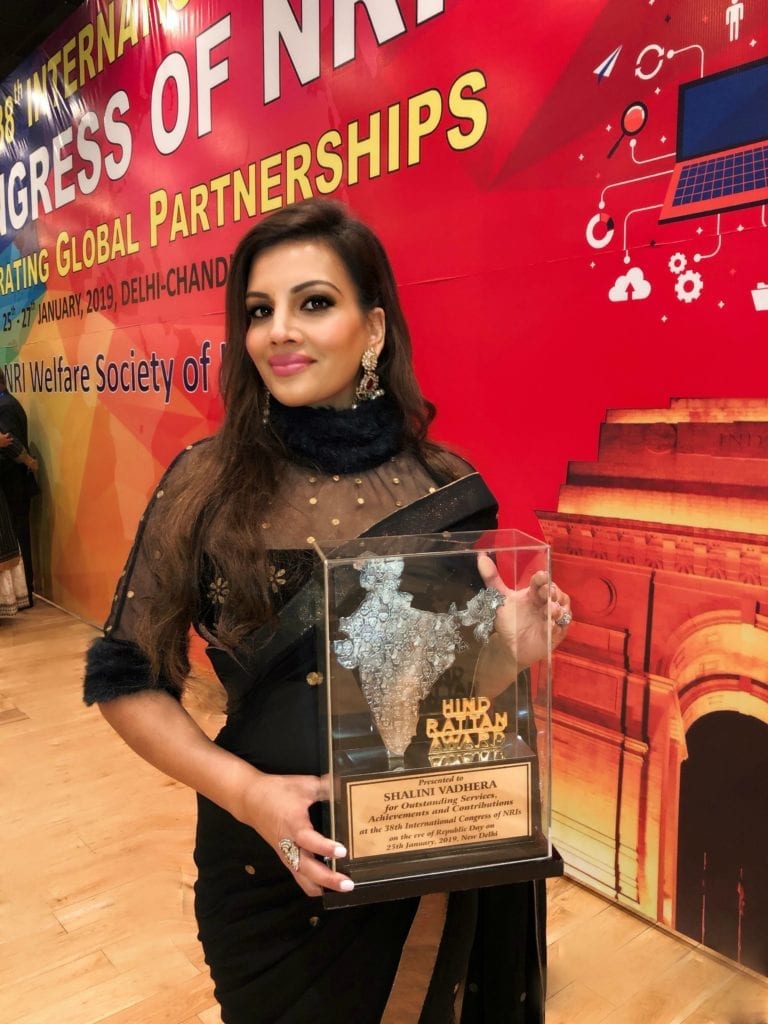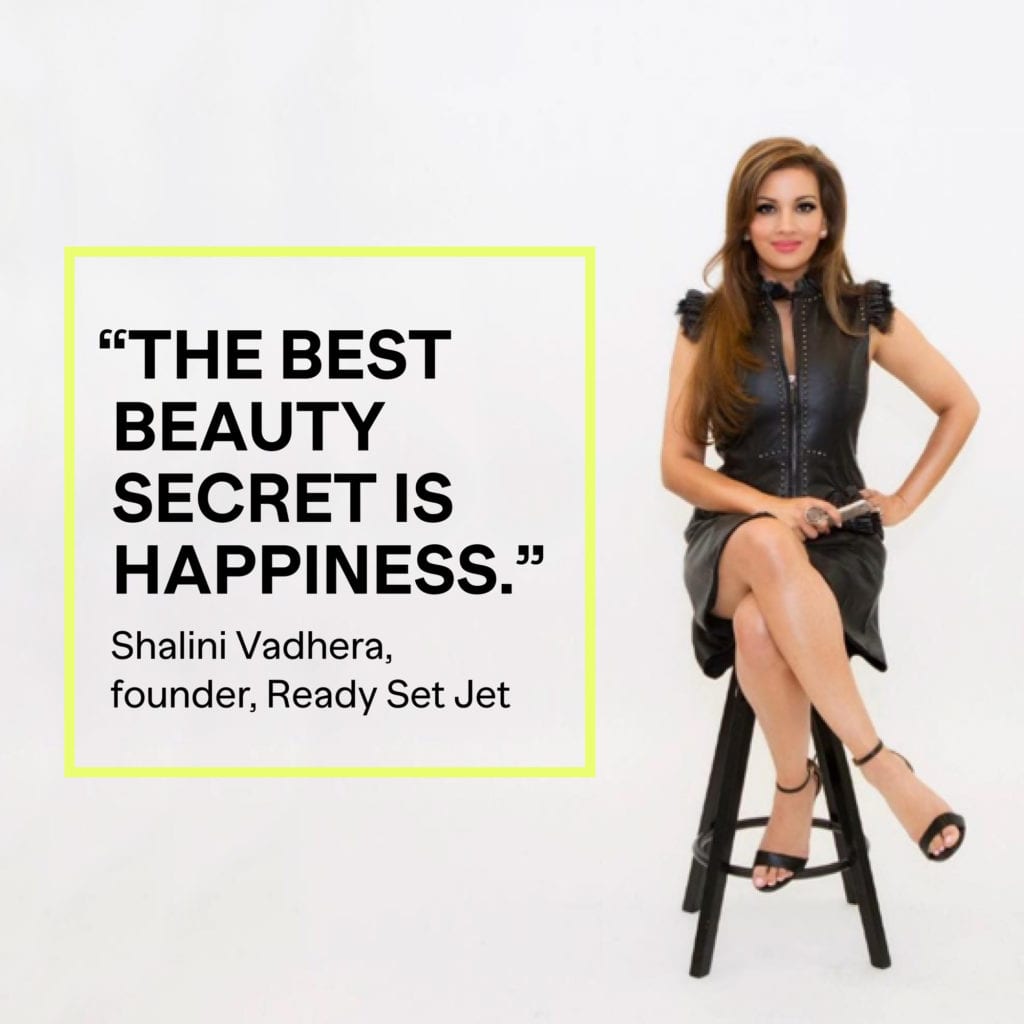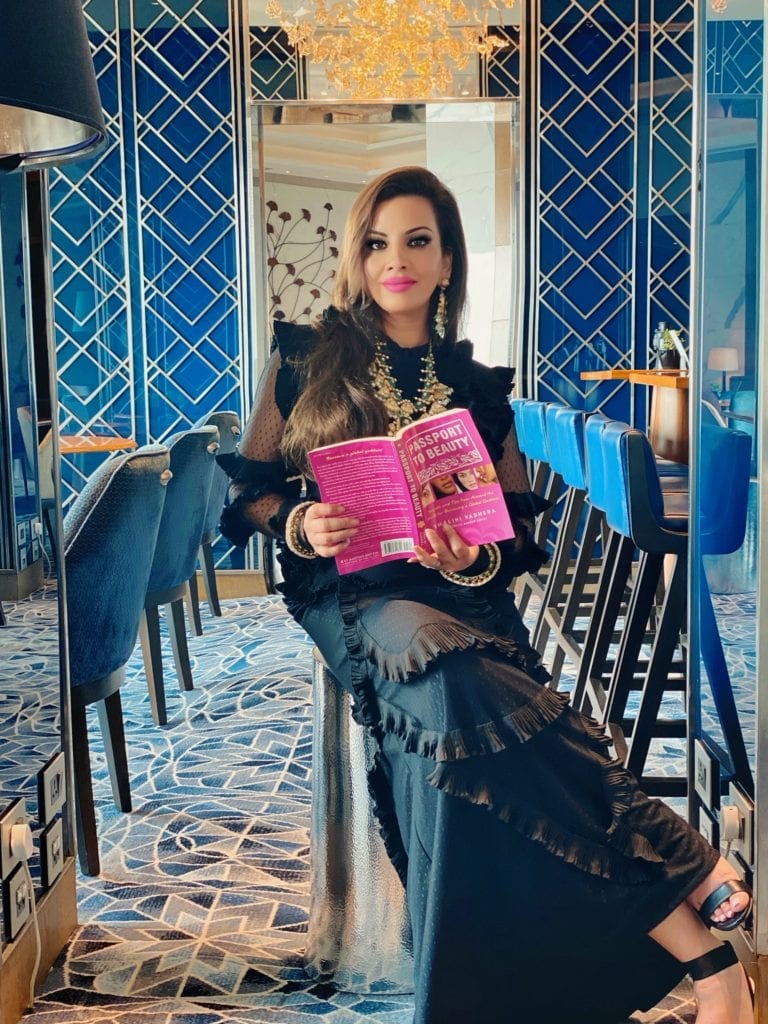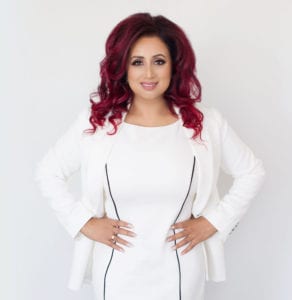Raj Girn: Hey, guys, thanks for tuning into another exciting episode of the `Transform Your Confidence Show.` You guys know that I love hanging out with you each and every week. And as always, I encourage you to share, comment, and post these episodes if they resonate with you so that others in your network can benefit also. This being the last week of the month, our theme is leadership and advocacy.
Have you ever wondered what it takes to be the kind of leader that consistently inspires, motivates, elevates and values everyone up, down and across their food chain? Why some leaders succeed despite having limited resources and why others fail despite having it all. Today’s episode is all about this. I speak with award-winning serial beauty entrepreneur and best-selling author Shalini Vadhera in an episode entitled How to Use Leadership and Advocacy Culture to Build a Multimillion-Dollar Company. This is part one of a two-part series with part two airing next Wednesday.
Here’s a bit about Shalini before I bring her on. She is an entrepreneur through and through. She started as jewelry and fashion entrepreneur, then pivoted into beauty, starting off her career as a celebrity makeup artist on the ‘Jay Leno Show.’ Then she moved on to penning the best selling beauty book called ‘Passport to Beauty,’ and appearing on numerous shows like ‘The Doctors,’ ‘The Today Show’ and ‘Dr. Oz’ as a beauty expert. She then forayed into founding a multimillion-dollar cosmetics company valued at $20 million, which set her permanently on the stage as a global leader in beauty innovation. Shalini has also created multi best-selling beauty brands for other companies that include the Baywatch movie by Paramount Pictures, Turner Classic Movies, and Fab Fit Fun, along with a star-studded list of influencers and celebrities placing over $100 million worth of product on the global market.
In 2015, she launched Power Beauty Living, a social platform for women that shares the knowledge of top female thought leaders and experts from around the world. And now she is the tour de force behind Ready Set Jet, a beauty brand built for the go generation with a strong social impact mission to empower women by using beauty as a vehicle for global change. Some of her accolades include being the recipient of The 2017 Mahatma Gandhi Award at the British Parliament, The 2019 Jewel of India Award from the Prime Minister’s Office, the 2019 A Woman of Excellence Award from the Women Economic Forum, and the winner of the Oprah Beauty O~ward.
Here is Part One of our conversation:

Raj Girn: Shalini, I’m so happy to have you on this show. We laugh about this all the time because every single platform that I’ve had a new show or a new concept to do with the content, I’ve had you on. So welcome to this one.
Shalini Vadhera: I’m so excited to be here. You’re right. I get to tag along with you for different kinds of it, but I love it. So, thank you for having me.
Absolutely, sweetheart. I’m really excited about this particular subject matter just because we’ve known each other for a long time now, specifically since 2003 if my memory serves me correct.
Eighteen years.
Yeah, it’s been a long time. So we’ve seen each other go through many leadership journeys, and since this particular episode is themed around leadership and advocacy, I want to start by asking you what you believe to be the top three leadership qualities needed to create an advocacy culture within an organization today.
Oh, gosh, that’s a great question. I mean, I look at it from a leadership standpoint, conviction. You’ve got to have a strong conviction in what you believe in, and obviously, your purpose. And then, flexibility. A lot of people don’t talk about flexibility being a really important leadership quality. Because especially when you’re starting a business or you’re starting a brand, or whatever, you need to be able to be nimble enough to move quickly based on the feedback that you’re getting from either your customers or your buyers or investors. And so flexibility is a really big one for me as well.

And that really does show up a lot with being able to identify if someone truly is a strong leader and especially in entrepreneurship, more so than in the corporate realm, and especially in the start-up phase, when you think you’ve got a proof of concept, but you don’t really know until you go to market. I know that you’ve experienced that multiple times. You’ve started many different enterprises. What would you say? I want to kind of garner your thoughts around this.
What would you say around truly how flexible a person needs to be when they’re in a leadership position, in a ground-level build?
I’m literally having this conversation with my team right now because we’re having to move so quickly. Here’s a great example of being flexible for the win. How about that? When I launched my first brand. I had coconut hair oil when I had met with the buyers of Sephora and they said, “Look, we like this idea because we know lashes are going to be the next big thing. Can you create something that would be an additional piece of this, but for eyelashes?” And so because we were flexible and we weren’t this really big bureaucratic corporation, we could move fast. And within six weeks we were able to create this lash conditioner and it became one of our best selling products. So that’s really what I mean about being nimble, being quick, being flexible, to move. We had never planned on ever doing a lash product, but because we were able to do so, it just changed the game for us.
It’s interesting you say that Shalini because I remember I was interviewing the editor-in-chief of ‘Huffington Post,’ back in the heyday of the ‘Huffington Post’ website when Arianna was still there. I said, how have you been able to just really grow as rapidly as you have and taken over a lot of the big boys out there? And you said the same thing. And for everyone who just joining us, here’s what it is, here’s the secret sauce: being able to not have all the red tape, the corporate red tape, that stops you from being able to make the right decision at the right time. This is really one of the big reasons why ‘Huffington Post’ was able to grow, because they were able to constantly, rapidly change what they were doing, go to market fast, do things that were needed to be able to make the changes rapidly. And this has been your experience, too. So this brings me to a question I want to ask you right off the bat: what type of leader would you say that you are?
Wow, that’s a good one. I really like to empower my team. I believe in leading by example, leading by positive motivation, getting everybody on the same page. I’m that kind of leader. I’m not a micromanager.
“I believe in leading by example, leading by positive motivation, getting everybody on the same page. I’m that kind of leader.” ~Shalini Vadhera
Anyone that knows me, who works for me, I am not a micromanager. I’m literally like, this is what we need to get done, I don’t care when you do it, but it needs to be done by this date and just bring me your best stuff. So I’m more of a leader, but I’m also a teammate. And for me, it’s important that we all feel that we’ve got the same amount of skin in the game and we’re working together collectively to reach these goals. And we’ve had some of those challenges always pop up with company culture, with different types of businesses, learning to navigate around personalities. Not everybody has that same thought process. So, I lead by just example and I’m lucky enough to surround myself with a team that actually comes in and really knows how to show up for me.
Shalini, you said something that is really valuable that I want to really pick up on. I want to make sure that people who are listening, watching, or even reading this as a blog, I want to ensure that they understood what you were saying. So Shalini is talking about her leadership style and it’s very indicative of an entrepreneur. What I mean by that is entrepreneurs and corporate executives tend to have a very different style of leading, albeit the corporate realm is starting to come around a little bit more. And I want to say what I mean by that.
The industrial revolution brought with it this idea that everybody had a place and there was a pyramid system with the CEO that sat at the top, and everything else filtered down the food chain to the workforce that was sitting at the bottom. This is changing with the advocation of the knowledge and technology industries that have really disrupted the space for us. And now what’s been happening in at least the last 10 years, if not more, we’ve been seeing a different style of leadership that’s been coming about, which has been more an inverted pyramid whereby you have the CEO that sits at the bottom, you have everyone going up, and then at the top, you have the workforce.
“In at least the last 10 years, if not more, we’ve been seeing a different style of leadership that’s been coming about, which has been more an inverted pyramid whereby you have the CEO that sits at the bottom, you have everyone going up, and then at the top, you have the workforce.” ~Raj Girn
And really, the difference between the two styles is that the CEO in the inverted pyramid space, which is the space that Shalini is really sharing here, is that the CEO really pays heed and attention to the people that they’ve trusted to do the jobs. And this is what I’m hearing here. She doesn’t micromanage. She expects people to get stuff done. But having said that, she’s also a strong leader by motivating people to keep pushing forward. And the other thing Shalini that I want to get your thoughts around this as well is, when you have lots of people that are working in lots of different environments and virtual is a big part of that today, how do you keep people on point with the mission and vision behind your brand and what you’re building? What do you do?
Yeah, absolutely. I mean, we are exceptionally remote right now. We have half our team in India. We have half our team in the U.S. A part of our team in the U.K., part of our team in Armenia. We’re just all a part of it in New York, so we’re dealing with all these different time zones. But one of the things that we do is we have a weekly call with everybody on the team, whether they’re direct C-Suite executives or they are contractors or they are publicists.
Just our whole team gets together and then we review the previous week of discussing our wins, our losses, our challenges and how we’re going to help each other move forward in the next week. And just that coming together as one.
Initially, when you start especially as an entrepreneur, you’re kind of siloed off, right? You’re working with one person on this particular vertical, then you’re working with maybe two people over here on this vertical and it becomes very isolated.
So for us, it’s very important that we have one area, whether it’s Trello or Slack, we really lean into some of these different technology platforms to allow us to just be connected where we have these WhatsApp groups. I mean, we’re constantly talking. You’d never think that we were oceans away from each other because it feels like we’re together. And I think, we celebrate our wins together, we understand our losses together, and that just keeps us a very tightly knit team. Because we understand at the end of the day, we’re all working towards this end goal and everyone’s been given credit for what they’re doing and they’ve been awarded for the work they’ve put in thus far.
You know Raj I’m a fan of loyalty and the people, some of my team has been with me since 2003. I would say three of my team members have been with me since 2003. The other ones that have come on have been with me maybe the last one to two years. And they’re phenomenal. So also giving them a little skin in the game, they have ownership of the brand as well. So they understand that we have to work as a team because if we don’t, what are we doing?

Right, Absolutely. I agree with that. I feel that a lot of what you’re saying here is leading to a question that I want to ask you. And it’s around this whole idea of mentorship as a part of leadership. So let’s go down that road now Shalini. The most successful leaders today and historically speaking, are those who are constantly on a journey of self-improvement. Now, you and I know this because we’ve talked about this continually for all the years that we’ve known each other, the different types of people we tap into, the different people that we are learning from. And for those people out there who don’t really see the importance of a growth mindset, because that’s kind of what we’re talking about here from a leadership perspective, right? Can you share why you feel that in order to be a good leader, a part of that is to be a good mentor and a part of that is to be a continual mentee? What are your thoughts and experiences around that?
I 100 per cent believe in mutual mentorship. That’s why part of my team is older than me. Part of my team is younger than me. Everybody, especially now with social media . . . like I have to really lean on my younger team because they’re the ones doing TikToks for us. I don’t know how to do that.
“I believe very strongly in the idea of mutual mentorship. I think that we can always learn from everybody. You don’t need to be a big badass leader and that’s the only person you’re going to go get mentorship from.” ~Shalini Vadhera
There’s so much to learn from so many people. And I think as you grow with that growth mindset that you were talking about, you realize that the more you learn, the more you know, the less you know.
Right.
You should be in a completely open state of learning wherever you can grasp that. It could be anything from just taking a little bit inspiration from a good podcast, to actually going out there and reaching out to your goal mentors, the people that have worked in the industry or have achieved the goals that you want.
There’s no excuse not to reach out to them because you can on LinkedIn, you can on Twitter. There are so many opportunities to reach out to these people and you never know who’s going to answer. So for me, I think not only being a mentor is important, because I found a big lack of women mentors when I was starting my career and it’s very important. It’s one of my personal value systems and missions to make sure that I’m there for other women, but also being open to being mentored.
Feedback is king. I go on these Twitter feeds of all these venture capitalists that will share, just give feedback to a new start-up, and then I’ll share the notes of these people just being so highly offended and just so absolutely rude about the feedback they were given. And that’s the best gift that an investor or a buyer or a peer can give you, because that’s really the only way you’re going to learn and be able to actually give the solution to the needs that these people are looking for.
Absolutely. And it’s interesting you say that because back in the day, when we first started off in entrepreneurship, I remember being the person that was so emotionally attached to what I was doing, that I hindered the growth that I was trying to accomplish because I felt that, how could somebody know better than me when I’m so vested and I’m so emotionally attached? And it’s actually the reverse of that. It’s the people that are detached, the people that aren’t invested that could actually see the clarity that you can’t see. So I’m really happy that you brought that to the table because a lot of people out there need to hear that Shalini. They need to hear it from people like you, that you have to give space and room for people to enter the conversation and enter with their advice and their experience, their expertise, and even their opinion firsthand of just coming across your brand.
You want to hear what that is because it’s the only way that you can say, “OK, I agree with this because of this. I don’t agree with this because of this.” But how can you do that if you’re not allowing the room for people to be able to feel comfortable enough to bring that forth and especially if they’re coming from different industries? I don’t know about you, but I found I’ve gone to the most valuable insights in developing business ideas and concepts from people who aren’t even in my industry. Talk a little bit about that as well from your perspective, because I know from various companies that you’ve founded and that you’ve been a part of, you’ve always had very diverse boards and very diverse people that you tap into.
Can we talk a little bit about that for people out there who are just starting up and they think that as long as they put all the work in and they’re dedicated and all the rest of it, that that’s enough when it’s really not? Can we talk a little bit about that?
I actually want to touch on two things. I think as you grow as a leader, it’s all about leadership, you have to learn the art of detachment. It’s probably the best gift and the biggest lesson you’ll learn. It’s difficult to take ego out of things, but when you do take the ego and emotion out of things, you really amplify and accelerate business the way that wouldn’t have otherwise been able to, being so emotionally attached to things. In addition to that, there is strength in diversity, right? There is strength in being able to learn from someone that brings a completely different perspective and point of view. We have really leaned into a diverse group of people for Ready Set Jet, and it’s been fantastic to see it because it’s mission-driven. So I’m learning as much as my team is learning.
“I think as you grow as a leader, it’s all about leadership. You have to learn the art of detachment. It’s probably the best gift and the biggest lesson you’ll learn. It’s difficult to take ego out of things, but when you do take the ego and emotion out of things, you really amplify and accelerate business the way that wouldn’t have otherwise been able to.” ~Shalini Vadhera
But then we’ve got the founder and CEO giving where he created this incredible technology where you could turn your corporation into a nonprofit within 60 seconds. I mean, it usually takes seven months. What he brings from the impact and philanthropic space, plus his network is invaluable. And that’s why I was like, I need you to be on my board. And then we’ve got Baroness Verma from the British parliament while she’s the chairwoman of UN UK women. So that brings an entire network and open resources for us to be able to meet like-minded women. But then we’ve got somebody that’s from the digital marketing world who knows that we’ve got only a few people in the beauty world that are actually doing this, because this particular brand is so much bigger than just beauty. But even previous to that, yes, diversification is important.
But then also, if you’re in a very specialized vertical, having people on the team that can execute and understand how to navigate that vertical alone is very, very important as well.

Absolutely. So I wanted to ask you this just so anyone that’s just tuning in, from your experience, from your having done this yourself, both sides being a mentee and a mentor, what are the main characteristics of successful mentorship as someone that is mentoring?
Listening is number one, right? I mean, it’s easy to dish out advice all day long, but if you’re dishing out the wrong advice because you’re not listening to the question there’s a problem there. So I think listening is one. And, as someone that mentors but is also a mentee, I really appreciate people that can understand my weaknesses and my strengths, and then can fill in the gap between the two, really being able to identify some of the blind spots.
I literally had a woman say to me this past week and she goes,”Oh, that’s your blind spot.” And I said, “Thank you so much for acknowledging that.” And she was like, “No, I’m so sorry. I didn’t mean to hurt your feelings”. And I said, “No, you absolutely didn’t. I’ve been waiting, actually, because I know it’s my blind spot. I’ve been waiting for someone to understand this is my blind spot. I need some help.” And so really from your mentoring sessions being open to allowing people to poke some holes and understand where you can really use help, and that’s when then the mentors can really step in and do their work. So those are two big things that stand out to me.
And then, of course, you know, the ones that are hands-on are always the best, right? You know, you need help this way. “OK, let me show you how to do it,” versus the ones that are like, “Yeah, I can set you up with this person and you can have a great meeting.” I mean, those are great, too. But sometimes you really need someone to roll up their sleeves and get dirty with you and show you a path that you may not have even known was even there for you to explore.
“Sometimes you really need someone to roll up their sleeves and get dirty with you and show you a path that you may not have even known that was even there for you to explore.” ~Shalini Vadhera
So when you mentor how do you decide that this person is right to be mentored by you? What are the couple of things that you look for?
I really look for women. I mean, that’s just, again, a personal mission of mine, but ones that are open to feedback. It’s difficult to mentor someone if they think it’s their way or the highway and they don’t need any help. Then it’s a waste of my time. It’s a waste of their time. And we know that it’s not going to go anywhere. So usually I dedicate 30 minutes to an hour to mentor and I just let them call me or we’ll do a Zoom or Skype or a Google Meet and we just go through what they need. The ones that are open to learning and really want that mentor, you can always tell the difference.
So let me ask you this then Shalini: For someone that’s never solicited the aid of mentorship, what should they be looking for?
That’s a really good question. One, let’s say you want to build a billion-dollar brand. You know who doesn’t? It’s great to look at the people that may be in the city the same or a similar industry that have done it, and then start to really hone in on what kind of questions you have. Again, where are those weak points, where those blind spots that you feel you need some help with? The wonderful thing about being a serial entrepreneur is, at some point, you understand what you do really, really well and you don’t need to own every part of the business, right? You don’t need to own every single, like supply chain in marketing and all because you’re like, you know what, this is my lane. And I kick some serious ass in this lane. Now, these are the lanes that I either need to find someone so I can surround myself with the best in class, or I need to find a mentor in that lane because it’s an area that I might understand, but I might not excel at it.
So I think really being able to sit down with yourself and look at your business and identify the areas that you need to help strengthen, those are the areas that you go and seek the correct mentors and then have a list of questions. I mean, right now, time is the most expensive commodity, right? And so when you go and you reach out to mentors, I make sure that I’m very conscientious of the time they’re giving me. And I make sure to keep it very concise and not go off on 10 different tangents. It’s like, these are my four questions. I have one hour with you. This is what I really need help with.
“Really being able to sit down with yourself and look at your business and identify the areas that you need to help strengthen, those are the areas that you go and seek the correct mentors and then have a list of questions.” ~Shalini Vadhera
I love that. Anyone that’s just tuning in, you’re hearing it right here from someone that has spent two decades in both sides of the game here, mentoring and being a mentee. So I want to ask you just to close off the subject of mentorship, who were some of your mentors? I’m just curious, like who are some of your mentors, both in your personal and professional journey that you can share with people? And why did you specifically pick these people either in the personal or the professional space? Maybe pick one from each?
I don’t even know if some of them I went out and picked or they just happened to fall into my life. And then I was like, “Oh, they know a lot of stuff about this, so can you spend an hour with me?” You know, so I mean, professionally, I think Baroness Verma from the British Parliament, she had given me my award. I didn’t have a chance to talk to her. Then when I was asked to come back and speak at the House of Commons for about an hour on what we were going to do with India, she was there. It happened to be outside of the Parliament and I remember going, “God, I really wish I had, got her phone number or something.” Like she’s like a true badass woman. I mean, she’s had to fight to get to this position. She’s just, you know, you don’t want to mess with her. She’s a strong woman. I just felt like there was a lot I could really learn from her.

And she happened to walk by and I’m like, “Bareness do you mind if I just exchange numbers with you?” And I just asked her, “Look, I would just love to get some advice from you on how to move forward with this. This is something new for me. I haven’t ever done this before.” And she said “When are you back in London?” And I happened to be coming back a few months later. So instead of just even getting on the phone with me, she took the time to meet with me, have lunch with me. And now she’s someone I go to regularly. She’s come on as a formal advisor for our brand. So, professionally, I’ve learned so much from her and I just love and adore her.
And personally, I’ve got to say, my husband. As much as I am with Tony, and everyone’s like, oh, Tony and Shalini, and we have a lot of fun together. I mean, at the end of the day, he has a skill set I absolutely don’t have. He is an investigative journalist by trade, he has the gift of knowing how to put communication out there. He has a way of knowing how to take down my very robust conversations and pare them down to a very succinct, straight, clear way of communicating.
You are really good at that.
Well, I’ve had a lot of help from Tony. And then personally, I have a very strong spiritual side and I haven’t had a lot of say in that. But the right people have really fallen into my my world and they have mentored and guided and advised me to literally step into my purpose. And that is priceless.
Absolutely.
Thank you so much for staying until the end, guys. I really hope you enjoyed this show and will action the many insights that were shared. If you found this show helpful. I’m so glad. I would love your support by subscribing to this podcast on your Apple and Android platforms search `The Transform Your Confidence Show` and on our YouTube channel at the Open Chest® Confidence Academy. And please join our Facebook group at `Transform Your Confidence` because that’s where I share knowledge and resources about mindset, media, communications, branding, marketing, leadership, and advocacy for busy executives and entrepreneurs, as well as those seeking to elevate the quality of their life.
And I want to leave you with something this week, guys, something I’ve learned through many years of experience.
“Confidence is created, curated and cultivated through consistent growth. It’s not inherited, borrowed, purchased or stolen.” ~Raj Girn
And trust me when I say I know this because I’ve tried all the quick fixes and they don’t last. The only lasting method is finding a guru. That is someone who is further along the journey than you are, doing the work. So you have an indelible relationship with the outcome and paying it forward because, heck, what’s the point of success if we can’t share it? I want you to sit with this, guys, and, as always, I’ll see you next week.
To Contact Shalini Vadhera:












